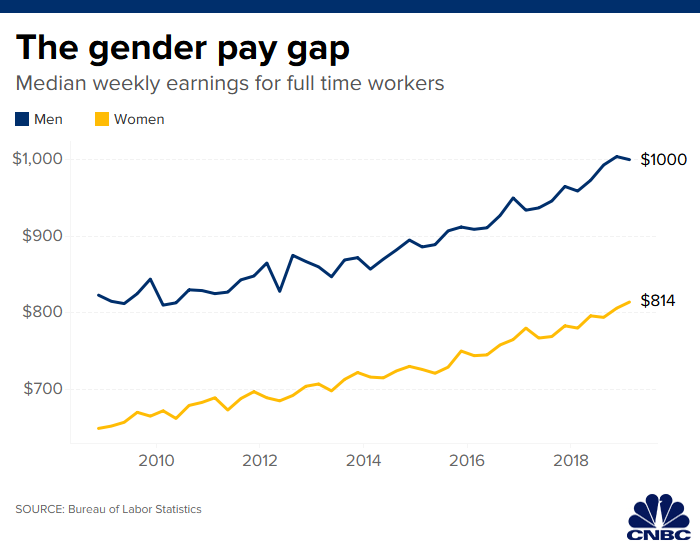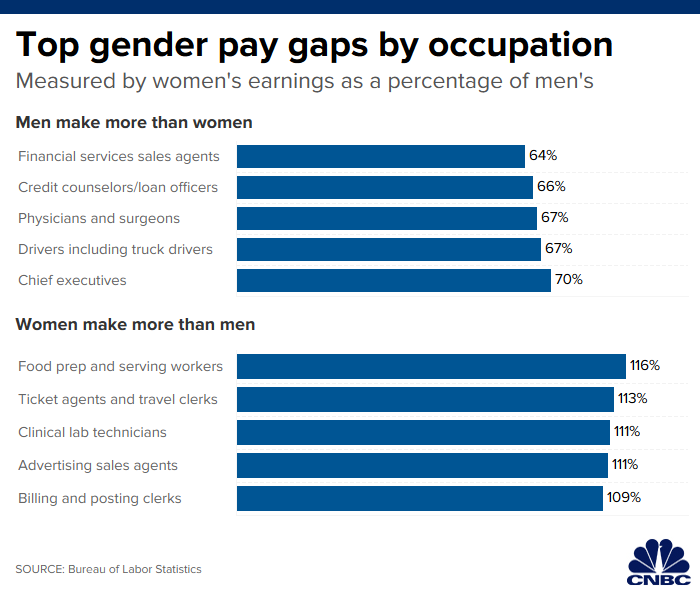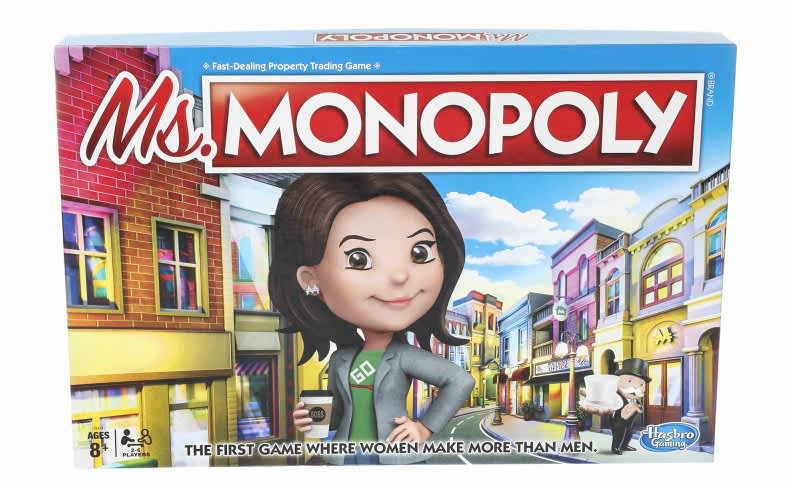Ms. Monopoly game.
Source: Hasbro
The typical 8-year-old probably doesn’t know much about the gender pay gap. Now the topic could come up if she or he plays the new game, Ms. Monopoly.
Some critics are skeptical, however, of how helpful those conversations will be.
Toymaker Hasbro announced this week the rollout of the board game in which female players receive $1,900 at the beginning of the game, compared with $1,500 for male players. Girls also get $240 each time they pass “Go” on the board, while boys get just $200. Instead of a real-estate mogul, Ms. Monopoly invests in female entrepreneurs. The front of the box is adorned with a woman in a sassy stance and steel-colored blazer, gripping a to-go coffee. It reads: “The first game where women make more than men.”
Detractors say the rules of Ms. Monopoly may be well intentioned but gloss over the troubling forces behind the fact that women in the U.S. earn 80% of what men earn.
“A more apt version of the game would have male players face the penalties women face in the workplace,” said Jennifer Borda, an associate professor specializing in feminist studies at the University of New Hampshire.
In the real world, women ask for raises just as often as men but are less likely to get them. Men are more frequently promoted into manager-level roles and of the CEOs who lead the companies that made up the 2018 Fortune 500 list, just 24 were women.
“If money can solve a problem, it’s actually a really small problem,” said Amy Peng, an associate professor in the department of economics at Ryerson University. “There are a lot of barriers that face women.” As an indicator of the problem’s insidiousness, by some estimates the gender wage gap could persist for at least another 50 years.
“We believe this game and its content embody a positive message about female empowerment that we hope is embraced by a wide variety of audiences,” said Kristina Timmins, a spokeswoman for Hasbro.

Since Ms. Monopoly doesn’t address the causes of the gender wage gap, some critics say it suggests women need a head start simply because they’re, well, women. “Are you doing this because you think women are not as productive as men and need to be overcompensated?” Peng said.
“It’s unhelpful to portray women as needing special advantages,” said Christine Sypnowich, head of the philosophy department at Queens College and a feminist scholar. “What women need is to be treated as equals with respect.”
The toymaker could have opted for a more meaningful way to tackle the wage gap, said Elise Gould, a senior economist at the left-leaning Economic Policy Institute.
“Hasbro can look at the opportunities they provide for women in the company, versus men,” Gould said. “Who’s in leadership? Who’s getting promotions? They can take a hard look at their own personnel issues and use that as an example for the real world as opposed to the game world.”
Hasbro’s executive management team, for instance, has seven men but just one woman.
Timmins, the spokeswoman for Hasbro, said women make up more than half of the company’s workforce. “We continually evaluate new ways to support the growth and development of all employees, including women,” she said.

Although Hasbro’s new game is supposed to empower women and girls, it fails to recognize the woman behind the invention, said Mary Pilon, author of “The Monopolists.”
“It’s a glaring omission,” Pilon said.
Pilon has extensively documented how Lizzie Magie received a patent in 1904 for an invention she called The Landlord’s Game, and which set the rules for modern-day Monopoly, including corners labeled “Go to Jail” and chances to buy up railroads, collect money and pay rent.
There’s now a consensus among many historians that Magie was the creator of Monopoly, but still, Pilon said, Hasbro cites the narrative that an unemployed man named Charles Darrow invented the capitalistic game as a distraction from the hopeless days of the Great Depression. Iterations of Magie’s game were played by Quakers living in Atlantic City, New Jersey, where Darrow came into contact with it. He copied the game and sold it to Parker Bros. in 1935, according to Pilon.
It’s unhelpful to portray women as needing special advantages.
Christine Sypnowich
feminist scholar
Magie sold her patent to Parker Bros. that same year for $500, but would never benefit from any of the tremendous financial success of Monopoly. In the 1940 census, Magie describes herself as a “maker of games,” with an income of $0.
Timmins told CNBC that “the Monopoly game as know it was invented by Charles Darrow.” However, she added, there have been many property trading games throughout history and “Elizabeth Magie – a writer, inventor, and feminist – was one of the pioneers of land-grabbing games.”
Still, it’s disingenuous of Hasbro to make a game highlighting the gender wage gap and women entrepreneurs and fail to mention the feminist history of the game, Pilon said. (Just 1% of patent filers were women when Magie applied for hers in 1903.)
“To have the company deny the creator was a female in 2019 is pretty surprising, to say the least,” Pilon said.
More from Personal Finance:
Women who want to start a business should avoid these mistakes
Spent a lot recently? These 5 things will boost your finances
Five things single parents absolutely have to pin down
